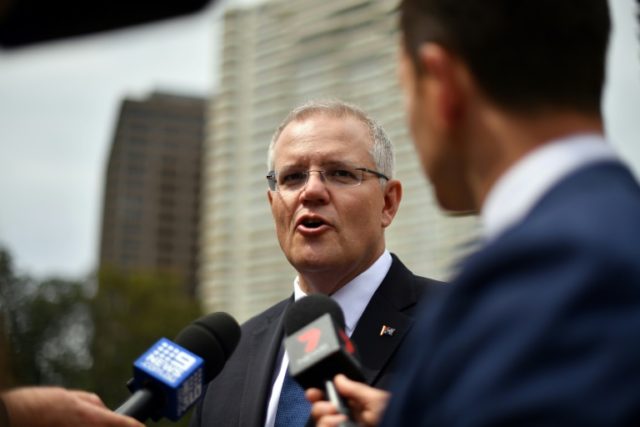Australian Prime Minister Scott Morrison delivered a foreign policy speech on Thursday that rolled out a $2 billion infrastructure bank that will loan money for telecommunications, energy, water, and transportation projects to Pacific nations.
Another billion dollars was committed to regional business investments designed to counter China’s growing influence in the Pacific, which Morrison described as Australia’s home turf.
“Australia has an abiding interest in the South-west Pacific that is secure strategically, stable economically and sovereign politically,” Morrison declared.
“This is our patch. This is our part of the world,” he said. “We are connected as members of a Pacific family.”
Morrison laid out an ambitious diplomatic program that also includes sending more embassy staff to Pacific Islands Forum member nations and increasing military coordination, with the Australians establishing an elite team of Defense Force trainers ready to visit other nations upon request.
New Zealand on Thursday also announced it would create a $6.8 million fund for “cultural engagement” and military coordination with Pacific island nations. France and the United Kingdom have recently made commitments to increase the Western diplomatic presence in the region.
This is not a new formulation for Australian regional strategy; Prime Minister John Howard used almost identical language as far back as 2004. At the time, some Pacific leaders were chafing at Australian interventionism and criticizing Canberra for “bullying” smaller nations. The Australians said they were primarily interested in rescuing shaky regional economies and political systems from collapse.
Fourteen years later, the big story is China showing everyone what a “Big Brother” bully really looks like, luring cash-hungry Pacific islands into inescapable debt traps. With encouragement from the United States and assistance from Japan, Australia is working up an alternative to China’s massive Belt and Road infrastructure project that will help island nations develop without compromising their sovereignty.
As Australian officials put it during a summer diplomatic drive, Australia is keenly aware the Pacific is an area where there are “new players,” and Canberra wants to be seen as the “partner of choice.”
Australia spends far more in the South Pacific than China does – about four times as much over the past decade – but China has been spending the kind of money that buys major political influence. Both administration officials and opposition politicians have worried that Australia is taking its regional influence for granted while Beijing throws around eye-popping sums to finance splashy projects, hooking island governments on loans they will never be able to repay.
All parties in Australia have grown circumspect about naming China as their great South Pacific rival, since relations between Canberra and Beijing are just beginning to thaw after accusations the Chinese were meddling in Australian politics.
One of the first big tests of the U.S.-Australia-Japan regional alliance is playing out in Papua New Guinea, where the three nations are competing directly with a Chinese company to build a telecommunications network.
“We’ve seen a growing concerted effort to really ‘up the game’ and compete with China head-on in the Pacific. The picture is slowly forming of the growing cooperation between Australia, the U.S. and Japan,” Jonathan Pryke of the Lowy Institute in Sydney told the Wall Street Journal on Thursday.
The Chinese responded to Morrison’s speech with guardedly conciliatory remarks about the importance of cooperation, insisting that Beijing does not view the Australians as competitors.
“We are not rivals, and we can absolutely become cooperation partners,” Chinese Foreign Minister Wang Yi said on Thursday after meeting with Australian Foreign Minister Marise Payne, the first meeting between the Chinese and Australian foreign ministers in two years.
“While China and Australia do not always agree, it is vitally important that we always match our words with actions,” Wang said. “We are confident Australia will translate its positive will of growing relations with China into actual actions.”
Payne responded by saying China and Australia “realistically acknowledged” the differences in their “dynamic relationship” and will focus on “managing them respectfully, mindful of the tremendous opportunities the relationship presents to both our nations.”

COMMENTS
Please let us know if you're having issues with commenting.